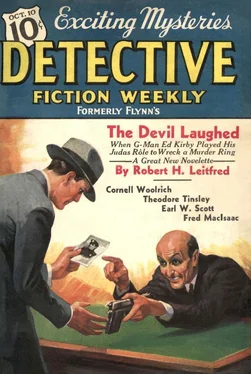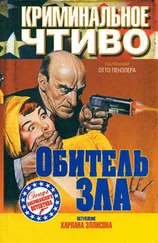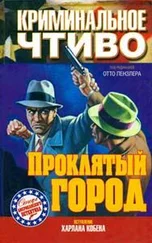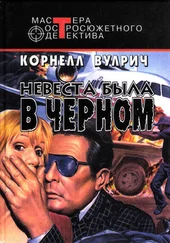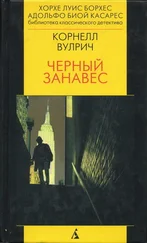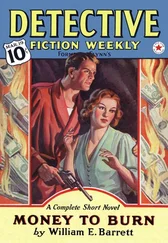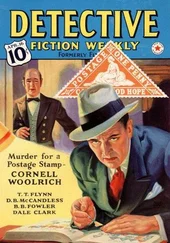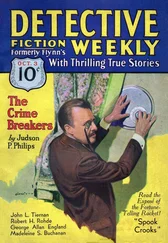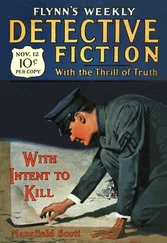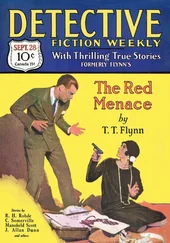Корнелл Вулрич - Detective Fiction Weekly. Vol. 50, No. 5, October 10, 1936
Здесь есть возможность читать онлайн «Корнелл Вулрич - Detective Fiction Weekly. Vol. 50, No. 5, October 10, 1936» весь текст электронной книги совершенно бесплатно (целиком полную версию без сокращений). В некоторых случаях можно слушать аудио, скачать через торрент в формате fb2 и присутствует краткое содержание. Город: New York, Год выпуска: 1936, Издательство: The Red Star News Company, Жанр: Детектив, на английском языке. Описание произведения, (предисловие) а так же отзывы посетителей доступны на портале библиотеки ЛибКат.
- Название:Detective Fiction Weekly. Vol. 50, No. 5, October 10, 1936
- Автор:
- Издательство:The Red Star News Company
- Жанр:
- Год:1936
- Город:New York
- ISBN:нет данных
- Рейтинг книги:4 / 5. Голосов: 1
-
Избранное:Добавить в избранное
- Отзывы:
-
Ваша оценка:
- 80
- 1
- 2
- 3
- 4
- 5
Detective Fiction Weekly. Vol. 50, No. 5, October 10, 1936: краткое содержание, описание и аннотация
Предлагаем к чтению аннотацию, описание, краткое содержание или предисловие (зависит от того, что написал сам автор книги «Detective Fiction Weekly. Vol. 50, No. 5, October 10, 1936»). Если вы не нашли необходимую информацию о книге — напишите в комментариях, мы постараемся отыскать её.
Detective Fiction Weekly. Vol. 50, No. 5, October 10, 1936 — читать онлайн бесплатно полную книгу (весь текст) целиком
Ниже представлен текст книги, разбитый по страницам. Система сохранения места последней прочитанной страницы, позволяет с удобством читать онлайн бесплатно книгу «Detective Fiction Weekly. Vol. 50, No. 5, October 10, 1936», без необходимости каждый раз заново искать на чём Вы остановились. Поставьте закладку, и сможете в любой момент перейти на страницу, на которой закончили чтение.
Интервал:
Закладка:
“Donnegan,” said Reynolds loudly, “do you confess that you have been impersonating Jonathan Steele?”
“I didn’t want to do it,” pleaded the old man. “Mr. Farrell was the one. He made me do it, sir.”
“I... I must sit down,” gasped Upton Reynolds. “Your arm, Cody. Lead me to a chair.”
I took him inside and he flopped upon a chair. He pulled out a big handkerchief and wiped his brow and then he looked up at me with twinkling eyes.
“I have imperiled my reputation, I perhaps my liberty,” he said, “by staking everything upon a crack-brained theory. I have been in a state of mortal terror since leaving Los Angeles, since last night when Rhoda phoned me your message. I didn’t really believe that it was Donnegan — and, if you had abducted Jonathan Steele, all of you would have got a long term of imprisonment.”
“If you’re responsible for the arrival of the sheriff and his posse, you saved all our lives, sir,” I told him.
“Of course I’m responsible,” he said testily. “I rose at seven this morning and motored down to the Soldiers’ Home. I persuaded Colonel Edwards, against his better judgment, to accompany me to Santa Barbara. If he hadn’t thought there was something queer about Donnegan’s departure from the Home, he wouldn’t have budged.
“I went to the Sheriff of Santa Barbara and told him — well, I made flights of the imagination sound like facts. What persuaded him to investigate was that no report of the abduction of Jonathan Steele had been made and when he phoned to Steele’s residence it was absolutely denied that Steele had been abducted. He collected deputies and we started for this place.”
“But what made you think we were in danger, sir?”
“It was obvious, if the ring around Jonathan hadn’t reported his kidnaping, it was because they hoped to recapture him. And it meant that it wasn’t Jonathan Steele but Donnegan you had carried off. Now it happens that the men employed as private detectives by Steele, in their off hours have incurred the enmity of the police of Santa Barbara. The sheriff of the county said he would be very glad to catch them taking the law into their own hands.
“Well, when we turned into this cañon we heard heavy firing going on — it seems that we were just in time. Did you find Stephen Steele?”
“No, sir. We had no time to search the place. We are sure that, if we have Jonathan unmasked, Patterson will have to have Steele released.”
“Well, well, I’ve never before risked my professional reputation on such a long shot,” he said. “Cody, there is a phase of this situation that probably has not occurred to you. Whether Stephen Steele is dead or not, we know he was alive a month ago.”
“Of course, sir.”
“Then, since it appears that Donnegan has been impersonating Jonathan for a year, Stephen inherited the entire Steele fortune.”
“That’s right.”
And you and Miss Robinson were willed all the goods of which he was possessed. It’s possible, Cody, that you own ten per cent of the Jonathan Steele holdings in motors and other corporations.” He gazed at me whimsically.
I almost fainted. Fifty million dollars would be ten per cent of that vast estate. Then I drew a deep breath. “ I’d rather have Steve alive,” I told him. “And furthermore, he is alive. And I was robbed of half my five thousand dollars.”
In came the sheriff and Donnegan and Dick and Jim. Clarice came up and took my arm.”
“I got my man, Mr. Reynolds,” she said. “Though I practically proposed to him.”
“You did not,” I said indignantly. “I reached out and grabbed you.”
“Huh!” said Clarice Dick whooped with laughter.
“You’ve been right so far, Mr. Reynolds,” said the sheriff. “What’s the next move?”
“Since Donnegan accused John Farrell, Steele’s secretary, of having arranged this impersonation, the next move is to arrest him before he learns what happened at this place.”
“I’ll phone from the nearest place to have him nabbed and brought to the District Attorney’s office.”
Chapter XXIII
The Great Conspiracy
The District Attorney of Santa Barbara County sat behind his desk. There were present Dick Barton, Upton Reynolds and myself. Tommy Donnegan was under guard in an outer office. John Farrell was being given the works.
The secretary of Jonathan Steele was a heavy set man of forty-eight or fifty with black hair touched with gray. He had large well-shaped features, hard gray eyes and a solid jaw. He was pale but composed.
“You have heard the case against you,” said the District Attorney. “These gentlemen took the law into their hands. If they had failed in their enterprise they would be sitting where you are. I’m aware that you took orders from Roscoe Patterson of New York. I’ll do what I can for you at the trial if you come clean. You know the jig is up. We don’t actually need your testimony. The facts are damning enough. Use your own judgment.”
“I’ll talk,” said Farrell. “I never thought we’d win out. I was forced into this. I want to say here and now that no murder was ever contemplated by Mr. Patterson or myself. We were victims of accident — we were the puppets of economic conditions.”
“Afraid I don’t get you,” said the District Attorney.
“I’ll explain. Mr. Steele died of a heart attack on Feb. 28th, 1935, a few days after our arrival here from Detroit I phoned Mr. Patterson in New York. He said to conceal his death. He would fly out immediately and take charge.”
“You mean there was no attending physician?”
“He died in the night. I discovered his death, phoned immediately and received my orders. I at once discharged his valet, who had been with him for some years. I let nobody enter and remained in the room with the body for twenty-four hours until Mr. Patterson arrived.
“Mr. Patterson was in a frightful state. He said that Jonathan’s death at this time would bankrupt the company, ruin himself and hundreds of thousands of people — that death and inheritance taxes would pick the carcass of the Steele Corporations clean. ‘The market is in such a state that liquidation will probably cause a general panic and throw national recovery back for years. If there was only some way we could carry on for six months. It would give me time to prepare, to arrange things,’ he said.
“I told him it was impossible. That concealing a death was a felony. ‘That’s of no consequence,’ he said. ‘Jonathan Steele can’t die; he mustn’t be allowed to die. Farrell, if we could get somebody, an actor — somebody whom we could hedge around, let people see him at a distance. Farrell, how would you like to make a hundred thousand dollars?’
“ ‘Very much. How?’
“ ‘I don’t know. It ought not to be hard to find a man who could do it. His grandson is in Europe and I’ll arrange that he stays there. Get rid of everybody in this place who knows him. I’ll have a doctor come from New York, a nurse — he’s ill — see. We’ll confine him to his room.’
“While he was talking I had — well,” he smiled faintly — “it seemed an inspiration at the time. Some years ago I was a clerk at the Soldiers’ Home in Sawtelle and there was a veteran there who looked a little like Jonathan Steele’s pictures. I had remarked about it once to him and he was quite tickled. I remembered that we had to discipline him once for stealing some money from another inmate. I told Patterson about him.
“ ‘He might serve if he’s still alive,’ he said excitedly. ‘Find out. Get him here.’
“Well, that’s the way we fixed it. Donnegan was ten years younger than Jonathan, and healthy. Jonathan had had no personal friends for years. They had all died and he wanted no new friends. He had been practically a recluse. We installed new servants—”
Читать дальшеИнтервал:
Закладка:
Похожие книги на «Detective Fiction Weekly. Vol. 50, No. 5, October 10, 1936»
Представляем Вашему вниманию похожие книги на «Detective Fiction Weekly. Vol. 50, No. 5, October 10, 1936» списком для выбора. Мы отобрали схожую по названию и смыслу литературу в надежде предоставить читателям больше вариантов отыскать новые, интересные, ещё непрочитанные произведения.
Обсуждение, отзывы о книге «Detective Fiction Weekly. Vol. 50, No. 5, October 10, 1936» и просто собственные мнения читателей. Оставьте ваши комментарии, напишите, что Вы думаете о произведении, его смысле или главных героях. Укажите что конкретно понравилось, а что нет, и почему Вы так считаете.
